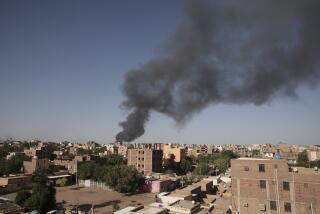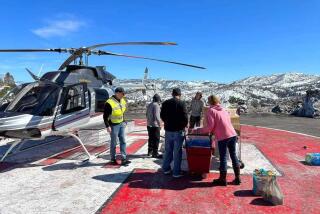Pentagon Calls Airdrop Over Bosnia a Success : Relief: But for hours, residents couldn’t find crates of food and medicine. A second mission is completed.
- Share via
WASHINGTON — The Pentagon said Monday that its first humanitarian airdrop into eastern Bosnia was a success but that the mountainous, tree-covered terrain apparently made many of the crates difficult to locate, and they had to be pinpointed by American spy satellites.
Officials said that three unarmed C-130 cargo planes, flying from the U.S. Rhein-Main Air Base in Germany, dropped 21 tons of food and medical supplies over the eastern village of Cerska early Monday morning, but the Bosnians were unable to find them for several hours.
American and Bosnian accounts differed widely on the accuracy of the drops, conducted at night from an altitude of 15,000 feet--far above the 10,000-foot ceiling usually considered the maximum allowable to ensure reasonable accuracy in such operations.
Defense Secretary Les Aspin issued a statement saying that pictures taken by American spy satellites had pinpointed most of the crates “within the identified drop zone” and said that U.S. officials believe that the remaining bundles landed nearby.
But the Bosnians, hampered by snow, trees and sharp ridges in the Cerska area, insisted for several hours that the parachute-borne pallets had missed their mark. Eventually, American officials passed on the precise map coordinates to help local authorities find the supplies.
Early this morning, three U.S. cargo planes completed a second drop. Pentagon officials said the United States will continue the operation at least through midweek before re-evaluating the effort.
It was not clear whether American military authorities would order pilots to fly at lower altitudes in the wake of Monday’s confusion. The high-altitude flights were designed to minimize the risk from possible Serbian antiaircraft fire. But pilots reported none on either drop.
The higher the cargo planes fly, the less accurate the airdrops because wind can carry away the cargoes’ parachutes before they hit ground.
President Clinton has said that providing relief to local residents is only part of the reason that he ordered the airdrop. The Administration also hopes that the operation will demonstrate sufficient international resolve to get the Bosnian peace talks moving again.
Those talks resumed in New York on Monday under the aegis of the United Nations, but officials said no breakthroughs were apparent. Bosnian Serb leader Radovan Karadzic said he has some new proposals to offer, but he gave no details Monday.
Fred Eckhard, a spokesman for the U.N.-brokered talks, said the three warring parties are “very close to an agreement and that, with sufficient leverage applied by governments, it could be wrapped up.” But no specific progress was reported.
The negotiations revolve around a plan drafted by U.N. envoy Cyrus R. Vance and Lord Owen, who represents the European Community, that would divide Bosnia-Herzegovina into 10 semiautonomous, ethnically based provinces.
Both the Bosnians and the United States argue that the plan does too much to reward the Serbs, who have taken the lion’s share of the land by launching a civil war in the region.
Meanwhile, the fighting in Bosnia continued, with Serbian fighters setting 10 Bosnian villages afire and pumping dozens of rounds of artillery shells into the Drina River valley.
The choice of Cerska for the initial airdrop was more than mere convenience. Without any outside relief for the past 11 months, the eastern Bosnian village is the most desperate of the remaining Bosnian government strongholds. About 6,000 Muslims are trapped there.
Diplomats believe that Cerska’s heavily outgunned Muslims are unlikely to hold out much longer against Bosnian Serb forces. Bosnian commanders told U.N. representatives in Belgrade that there are about 1,500 wounded in Cerska.
As American planes prepared for the second airdrop, Bosnian Vice President Ejup Ganic appealed to the United States to change its airdrop targets so that the aid parcels would be parachuted farther away from Serbian lines.
American officials said that each of the U.S. planes used in Monday’s mission contained 16 crates of food and medical supplies. To guard against possible Serbian charges that it was taking sides, the United States permitted U.N. inspection of the supply crates before they left Germany.
Times special correspondent Silber reported from Zvornik, Bosnia-Herzegovina, and Times staff writer Pine reported from Washington.
More to Read
Sign up for Essential California
The most important California stories and recommendations in your inbox every morning.
You may occasionally receive promotional content from the Los Angeles Times.













